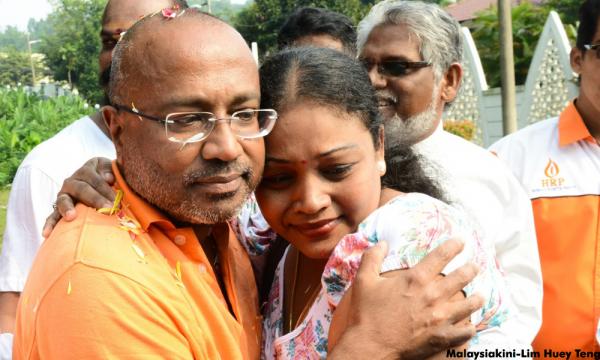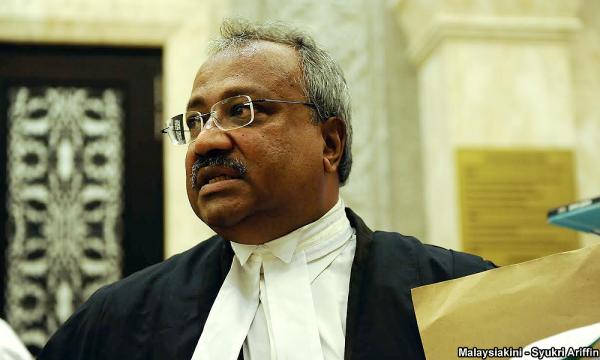INTERVIEW ‘You don’t judge a country by its skyscrapers, but by the way it treats its prisoners.’
This is the second of a two-part interview with former Hindraf leader P Uthayakumar, who described his two-year ordeal of being a guest of the state. Part 1 appeared yesterday.
What moved you to file this public interest suit for prison reforms?
Uthayakumar: I served the highest prison sentence in this country for a sedition charge, at two-and-a-half years, and later reduced to two years by the Court of Appeal, for highlighting the plight of the most vulnerable and most racially, religiously and economically victimised Indian poor by the supremacist Umno regime. I stand by what I said and did. I have no regrets. In protest and anticipating the obvious, I even refused bail pending my appeal.
Upon entering the Kajang Prison gates on June 5, 2013, I had the shock of my life at the prison culture that grossly violated, with impunity, of the following - the Federal Constitution, Prisons Act 1995, Prisons Regulations 2000 and the Standard Minimum Rules for the Treatment of Prisoners adopted by the first United Nations Congress on the Prevention of Crime and the Treatment of Offenders held at Geneva in 1955 and approved by the Economic and Social Council in 1977.
This suit is an expression of my outrage.
You also have come out strongly against the death penalty and other forms of inhumane punishment.
I had also applied for abolishment of the death penalty, life imprisonment, caning by the rotan and imprisonment for over 20 years. My saddest day in prison was when a fellow prisoner, Mohamad from Kelantan, was hanged in the early hours of a Friday morning, besides my mother passing away that is.
Another example was when a transvestite prisoner was given two strokes of the rotan, her silicone implants burst open, she collapsed and was carried away. God knows what happened to her thereafter.
About three months ago, I was told that a lawyer and my junior at my law school in London, whom I met at Kajang Prison on a criminal breach of trust case, some 10 days before I was released, had died at Kajang Prison at 49 years of age. So where does the common person stand? Unlike the outside, behind the prison walls there is actually ‘Satu Malaysia’, in that all prisoners are treated equally badly, irrespective of their race or religion.
What has been your biggest disappointment so far in this process?
My biggest disappointment is that my 76-page application, supporting affidavit and supporting documents was dismissed ab initio and right up to the Federal Court on a merely quarter page three-point preliminary objections by the Attorney-General’s Chambers without even having to reply to especially my aforesaid very serious allegations.
Once again, a very clever move to avoid answering and addressing the obvious injustices.
Do you think the judiciary should be part of the reforms?
Every day magistrates and judges throughout the country send hundreds of prisoners to prisons, but do they care what happens in prisons?
By virtue of Section 66 of the Prisons Act 1995 - “High Court judge may enter and examine the condition of the prison and of prisoners… question prisoners, prison officers… etc”.
There are similar provisions for Board of Visitors and the Prison director-general’s visits. But in all of my two-year imprisonment, I never came across a judge, a member of the Board of Visitors or even the director-general, even though I had made specific written requests for the same.
I even applied for the learned High Court judge to adjourn proceeding to visit Kajang Prison to investigate my allegations before making his decision, but my whole case was summarily dismissed on a mere quarter-page preliminary objections by the Attorney-General’s Chambers.
Does this setback mean you have exhausted the fight for prison reforms?
Just before the hearing both at the Court of Appeal and also the Federal Court on March 2, 2017, I had asked the attending opposing senior federal counsel to convey to the attorney-general and legal adviser to the government, Mohamed Apandi Ali, to use his good office to arrange for a meeting between myself and the Prisons Department director-general and Home Ministry’s top brass with the view to initiate prison reforms.
I told him that I was sincere in wanting to see through prison reforms. I will also follow up with a formal letter to the attorney-general. I am also considering the option of filing a judicial review application to the Federal Court maybe after the new chief justice takes office.
Of course, a lot more could be done with public support and especially the 82 Pakatan Rakyat lawmakers and members of parliament playing their part, for example in moving an emergency motion in Parliament.
Why do you think people are not interested in this issue?
One of the main reasons things have come to this serious and critical state is the general prejudice the public have against convicts. To me, they have already been punished by long prison sentences and the public kept safe. Therefore, there is no need for there to be punishment over punishment. We should give them a second chance. To err is human, and to forgive is divine...




